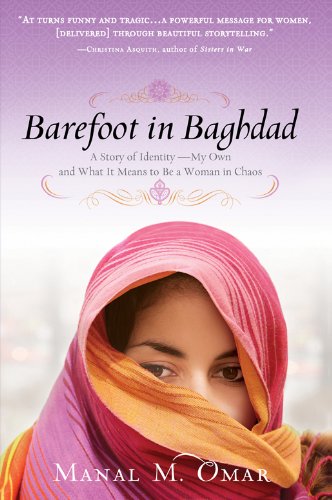
100 years from now, the Iraq War will be seen as a defining moment for the US, a time when not only democracy was shredded but the republic saw journalists actively work overtime to sell a series of bad, bald lies and start an illegal war.
But that's not the moment the war ended, that's when it started.

One of the few books addressing the effects of the war on the ground -- as opposed to War Porn glorifying the US military 'kills' -- is Manal M. Omar's Barefoot in Baghdad: A Story of Identity -- My Own and What it Means to be a Woman in Chaos which charts her journey to Iraq, as an American (and an Arab), to help the women of Iraq and what she ends up learning from and of Iraqi women. Omar was with the US Institute of Peace and in Baghdad from 2003 to 2005.
She writes of others attempting to help Iraqis, such as the late Fern Holland.
During my trips to the south-central governorates it became clear that i had to meet the womman who was quickly becoming a legend in the world of women's issues in Iraq: Fern Holland.
All of the women I interviewed, even in the most remote areas of Hillah, Karbala, and Al-Kut, mentioned Fern and her loe for Iraq and especially the women of Iraq. Women who met her explained how they were touched by her compassion and determination. They said that they found comfort in the fact that someone working with the United States was looking out for them. Even those women who complained about Fern would compliment her endlessly, only warning that her approach was too fast for the rural areas.
Later, many people tried to paint Fern, a lawyer by training, as a naive feminist idealist with little cultural sensititivyt. That description could not be further from the truth. Many times when I went to meet her in Hillah and Karbala, I would find her sitting on the curb and chatting with the guards. The Iraqis were touched by her humble nature and in awe of her fiery passion.
The first time I met Fern was inside the CPA compound in Hillah. As the petite blonde walted up to me, I could not help but think of the Iraqis' nickname for her: Barbie. Indeed, she looked like a small toy whipped up by Mattel. Yet the moment she spoke, all images of Barbie evaporated. Fern spoke with confidence, and she immediately demonstrated that she was a woman who liked to be in control.
She plopped down at the table where I was sitting and asked, "I need someone to cut through all the bullshit. Are you that person?"
She did not wait for an answer but instead launched into a tirade of how the window of opportunities to create a new Iraq was rapidly closing. She argued passionately that the people to pay the price were going to be the women of Iraq.
"Manal, I have met women engineers, lawyers, doctors -- absolutely amazing Iraqi women who would put most American women to shame. These women are unbelievably strong. And I am afraid we are setting them up for failure. We are giving them nothing but bricks and fancy equipment."
She spoke rapidly and quickly looked me over.
"But you know that better than I," she added under her breath as she continued to outline all the obvious mistakes the CPA, the U.S. Army, and the international organizations were making in their approach in Iraq.
Fern was well aware of the risks she was taking by speaking unequivocally about Iraqi women's rights, but she was desperate to make a difference during her time in Iraq. She believed the legacy the United States could leave behind was through Iraqi women. She was committed to establishing women's centers in the areas in which she worked.
Fern explained that she had heard about my initiatives and wanted to team up. She had the funds and she could get access to buildings and equipment for women's centers, but she needed someone to help with the softer side of the projects. She needed someone to create programs that would focus on providing women with the training and skills to manage the centers well.
March 9, 2004, Fern Holland, Robert J. Zangas and Salwa Ourmashi would be shot dead in their car outside Karbala. Many believed Holland was targeted for her work with Iraqi women. The dangers in doing that would eventually lead Manal M. Ombar to Jordan. Before that, there were attempts to help young Iraqi women that had her slamming into red tape, cultural notions and more. Such as when she tried to help "married, pregnant, teenage prostitute" Kalthoum, a sixteen-year-old who decides to sentence herself to an 'honor' killing:
Perhaps it was the fact that the drugs had worn off. Perhaps it was the pregnancy. I secretly believed her twenty minutes at the orphanage for disabled children had shocked her into the reality of her situation.
For whatever reasons, we stood at a crossroads. I called several Iraqi women's organizations for information, as I knew they would be the only people to tell me the truth about her situation. They all confirmed my worst fears: her return to her family would be a death sentence.
Yet Kalthoum was fully aware of this. In her heart of hearts, she seemed to believe it to be a reasonable sentence.
Over the span of a few days Kalthoum had developed a strong sense of the cosmic powers of karma, and she begged me to allow her to pay her dues to her family so that her suffering would end. She explained to me repeatedly that her life was over and that the decisions she made head left little room for her to start over.
However, she had four unmarried sisters at home. Her scandal had reached the tribe. Before, she believed that people would think she had been kidnapped or killed, and there would be no way to confirm she had abandoned her husband and broken the family honor. Now it was to be confirmed. If she were to go back to her family and face her sentence, then honor would be restored. If she were to run away, then her four unmarried sisters would pay the price. They would be shunned by society and would never marry because of their sister's tarnished reputation.
For 237 pages, this 2010 book explores topics most on Iraq have avoided. Did the Iraq War help Iraqi women? If you don't already know, you'll find the answer in the Barefoot in Baghdad. And you'll develop an admiration for Manal M. Omar who holds everything up to examination -- even herself and the work she attempts in Iraq.
In this series of ten important books of the last ten years, we've, so far, selected "Susan Faludi's The Terror Dream," "Joyce Murdoch and Deb Price's Courting Justice," "Anthony's Iraq: The Logic Of Withdrawal" and "Tori's Piece by Piece." Barefoot in Baghdad is our fifth pick, we've got five more to note. Due to the Great Recession, your local libraries are both overtaxed (seeing more patrons than ever before) and underfunded. Make a point to check out your local library or local branch of your library and consider letting your local representatives know that you support increasing the budget for the library.
